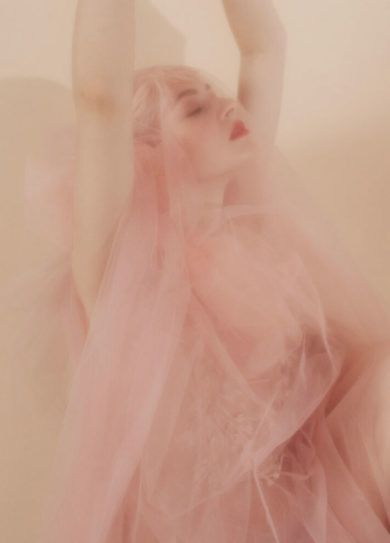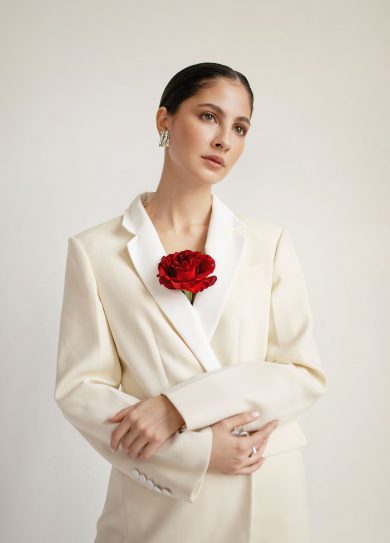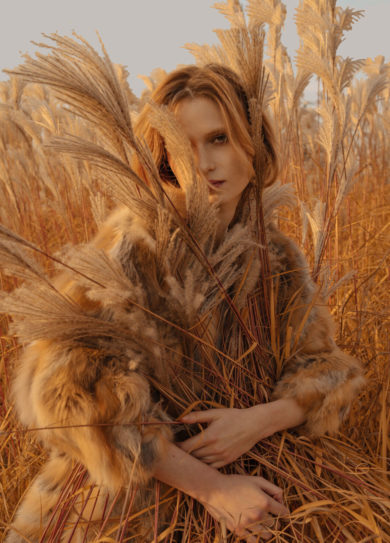
One of the central teachings of Wicca is that you’ll never meet the divine if you can’t find it in the depths of yourself.
Christina Oakley Harrington

Q: Can you recall your earliest experience of witchcraft and magic?
Christina Oakley Harrington: My early childhood from the age of five was spent in West Africa. My father joined the UNDP (United Nations Development Project), so at the age of five, I became an international person. My parents were not religious people, but they were people who loved the world. And my mother in particular, was kind of an amateur anthropologist. She was very, very fascinated by how people found meaning, and how people found meaning that was transcendent. So we were living in a really rural area outside of Monrovia, Liberia, and she just threw me in the back of the Jeep and she just said, “take me to your village, show me what the initiation ceremonies that are public, show me what your people do, I’m here to learn.” And I was the five year old who tagged along. My idea of what constituted the first religious ceremony I ever witnessed in my life was a transposition ceremony in northern Liberia.
Q: This must have been a profoundly potent initiation into religious practice.
COH: I remember I was absolutely terrified when out of the bush, came what looked like haystacks dancing with really frantic drumming. I clinged onto my mum’s hand and said, “mum, what is this?”. She said, “oh, these are the ancestors.” I could see little feet underneath, and I said, “I’m really, really scared”. But she said, “they won’t hurt you”. Fast forward, I’m 11 and we’re living in Burma ( now Myanmar), in the outskirts of Rangoon, and what we do every couple of weeks is we go to the pagoda, and we learn to meditate. My mom and her best friend go to the palm reader, and they go to the monk who sees the spirits and gives messages. That also gave another layer to what my idea of religion was. My early teens were spent in Chula in the outskirts of Santiago, where you could go out into the mountains, and there were little Catholic shrines where people have been killed in road accidents, and you have shrines for their spirits. That also influenced my idea of what religion is.
Q: What initially drew you to the practice of Wicca?
COH: So my idea of what religion was very shaped by that. My idea of how you interact with forces greater than the mortal was very imprinting for me. So when I was 14, my parents decided that I should go to an American High School and get ready to go to an American University, so I was repatriated to upstate New York. I was planted into the suburbs of upstate New York, and a very typical American High School. I was quite unrooted, I had a really bad culture shock. I didn’t adjust well. And I knew that the only thing that was going to save me was to find my own way of being and so I started looking around for what is it that my culture does, that is like the religions that I was brought up with, that were not my religion.
Q: What did your way into the practice look like?
COH: I looked around for a very long time. I was 23 and living in Philadelphia. I met this guy at a dance, and we just got to chatting as you do when you’re young. We stayed up all night talking about life, verse of everything. And he said, “you should look into this thing called Wicca. What you’re describing that you need, and you’re looking for.” He described it as the “West’s answer to Shamanism”. He handed me a book called, “Drawing Down the Moon” by Margot Adler who’s a great NPR journalist in her day job. I read it from cover to cover, I stayed up all night reading it. I phoned him up the next morning, and I said,” You’re right. You’re right.” I did it on my own for a while and I was like, “okay, now that’s as far as I can go by myself, and now I want to apprentice”. So I relocated to the UK, where my dad is from, and I started looking properly for old people in Wicca- people who’ve been doing it a long time.I did spells actually, because they were so hard to find. Old Wicca is something you apprentice with.
Q: From your perspective as a historian, what defines the practice of “Old Wicca” in relation to its more modern counterparts?
COH: Wicca is a word that’s changed shape a lot over the past 50 years. Since the 80s ( which is when I started with it) , the word has evolved to further involve practices that are not tied to a spiritual calling or a spiritual practice. Now I meet 16 to 18 year olds who say they’re into Wicca, and are into crystals and tarot cards, but when I ask, “ do you draw circle? Do you worship the goddess?”, they’re like, “what’s that?”. So that’s one generation. The people in my generation started with drawing a circle and worshipping the god and goddess. When we speak to people who are now in their 90s, they’ll say, “what do you mean Wicca, where’s your initiation? You can’t use that word without having apprenticed and been initiated”. So the word has evolved. If I’m going to talk about wicker in its early form, the essence of it is an initiatory, mystery religion. Whether it’s Ancient Greece, the cult of Isis, our Wicca is one of those where you are selected. You apply, and when you are selected, you’re deemed chosen by the gods for this particular path or not. And you make a dedication to the path.
Q: What are some fundamental ideologies of Wicca?
COH: One of the central teachings of Wicca is that you’ll never meet the divine if you can’t find it in the depths of yourself. If you want to have a life that is spiritually connected, you’ve got to connect with yourself. With that, Wicca greatly stresses social responsibility. So one of the things that I really liked about it was that all the Wiccans I met led lives that were very unique to themselves, and yet they didn’t talk about themselves all the time. For example, one was the sound engineer for the Beatles Abbey Road studio. He had created this unique sound for the Beatles. So I guess his creativity is where you see the practice. There is a unique vision and confidence and centeredness that applies to whatever their profession is.
Q: Someone once described the practice of Witchcraft as poemagogic,and seems to deeply serve the creative imagination.
COH: Yeah, there’s alot of creativity in any kind of shamanic mystery tradition, because you work a lot with mystical experiences. It’s about having mystical experiences with each other, trusting each other, helping each other have mystical experiences, and then taking it out into the world taking what it’s given you out into the world. The guys in Abbey Road Studios had no idea that their creative sound engineer, who kept coming up with new ideas, and who had the confidence to keep presenting them, they didn’t know where he got that from.
The creativity is very marked in that if you spend every second Saturday night of your adult life, or every third Saturday of your adult life, in a darkened room with incense and candles, with people who know you well, and only them, no spectators, you do something profound and intense. Symbols and objects are shown and you experience trances, and there are dream states, and there’s poetry. You experience your own writing, painting, soundboard building, software programming, so everything is affected by that.
Q: What do you think of the dichotomies of good and evil that seem to influence most people’s perception of non-conventional religious practices?
COH: I’m not afraid. I didn’t grow up afraid of spirits. I didn’t grow up afraid of that dichotomy. My parents were humanists and they believed that if there is evil, it’s in human behaviour.
Q: Has the practice of Wicca evolved much through the years?
COH: The whole idea of doing it from books is very, very new. The old way is that you find a witches coven, which is a religious unit, like how shamanic religions are small and connected by community. Each group is kind of grassroots, and you have different houses that are headed by priests and priestesses who transmit the tradition and do the rituals. There’s no Vatican at the top. But there is a tradition and everybody understands it by consensus.
There’s a very interesting relationship between popular culture and retail culture, and on any kind of cultural movements. It feeds both ways, right? Alot of the people I knew when I got started were people who got into Wicca and the occult because of the big popular boom of the late 60s. They were reading Dennis Wheatley and seeing cool horror films. So now, we’re in another little boom. I’m not thinking how they’re getting it wrong. I’m thinking of the people who are attracted to it by being enchanted and having their imaginations fueled by it. I wonder who in five or 10 years time, once retail advertising and pop psychosis move on, who will have stayed with it and gone deeper?
Q: Can you share some book recommendations for curious and seasoned Wiccans?
COH:Walt Whitman’s Leaves of Grass, Hilda Doolittle’s Poetry, and Wicca: Old Religion in the New Age.






